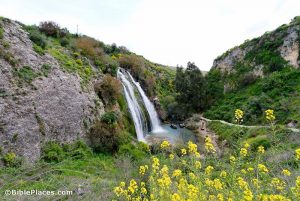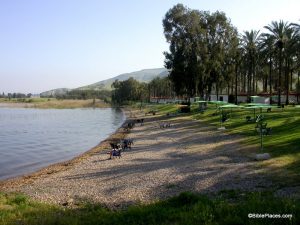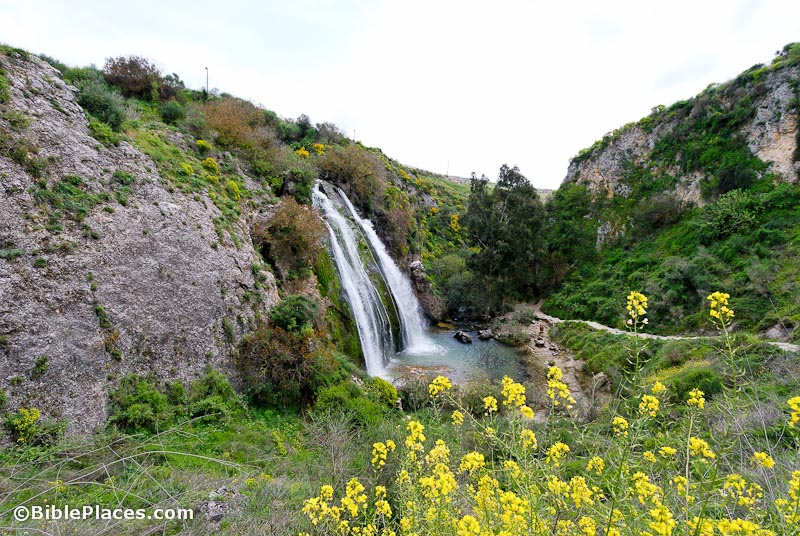Spring is changing into summer. More correctly, the rainy season is becoming the dry season. We are commanded in Scripture to be thankful (Eph. 5:4; Phil. 4:6; Col. 2:7; 4:2), and even, to express our thankfulness publicly: “I will remember the deeds of the LORD…I will meditate on all your works and consider all your mighty deeds” (Ps. 77:11-12; NIV). Therefore, I want to publicly thank God for his mercy in bringing down rain upon the land of Israel during this rainy season. We have witnessed a miracle of immense proportions!

Mill Falls in the Ijon Canyon on April 9, 2003. These falls are located near Metullah, Israel’s northern-most town. The source of the water is the Ijon Spring (1,650 feet above sea level), which is located in Lebanon, seven kilometers north of Metullah. The Ijon is the fourth largest source of the Jordan River. The falls are located between the biblical towns of Ijon and Abel Beth Maacah (1 Kgs. 15:20; 2 Kgs. 15:29; 2 Chron. 16:4). Photograph by Todd Bolen. Photo © BiblePlaces.com
Why, even on the 28th of April we got another 12mm. (almost half an inch) of rain in Jerusalem. In Gamla, which is on the Golan Heights, there was 30mm. of rainfall recorded.
After years of below average rainfall, at times only half of the normal rainfall, the country was in dire straits. Israel’s largest reservoir, the Sea of Galilee, in a gradual state of decline since 1992—the last time it was full—was at its lowest level ever, 214.42 meters (703.47 ft.) below sea level, 5.52 meters (18.11 ft.) below its full level of 208.90 meters (685.37 ft.) below sea level. The land’s underground aquifers, in the hill country and coastal plain, were in grave danger. Sea water from the Mediterranean was beginning to seep into coastal aquifers, threatening to corrupt them permanently. The country’s springs no longer flowed. It was a catastrophe!
As we began this past winter season (October-March), there was little hope that the water shortage could be reversed. Even a good winter would not have saved us. But then, God intervened. Some areas of the Galilee recorded as much as 180 percent of their normal annual average rainfall. Jerusalem received 819mm., 150 percent of its annual average. Haifa and Tel Aviv, Israel’s next largest cities, received 152 percent of their annual average. Places in the Upper Galilee (near the border with Lebanon) recorded 1,521mm. of rainfall!

The beach front of the holiday village of Kibbutz Ein-Gev on April 10, 2003. The beach is located on the eastern coast of the Sea of Galilee. Only a few months ago the edge of the water would not have been showing in this photograph, but would have been out of the photo, far to the left. Photograph by Todd Bolen. Photo © BiblePlaces.com
The Sea of Galilee rose, and rose—almost five meters so far this winter—and continues to rise. Now the lake needs less that a meter to be completely full. Mekorot, the national water company, is pumping water out of the lake and into above-ground reservoirs and the underground aquifers at the maximum rate, a million cubic meters a day. But even this is not enough! It is clear that the lake will now reach its maximum level. The only question is, will the gates of the Degania dam at the south end of the lake need to be opened resulting in the loss of much sweet water?
And I shouldn’t forget to thank the Lord for the unprecedented snowfall this winter. At the upper reaches of the Neve Ativ ski resort on the slopes of Mount Hermon, the snow is fifteen to twenty feet deep. Israel’s skiing season will continue into the month of June. And best of all, the melting snows will provide runoff that will continue to pour into the Sea of Galilee for weeks to come.































































































